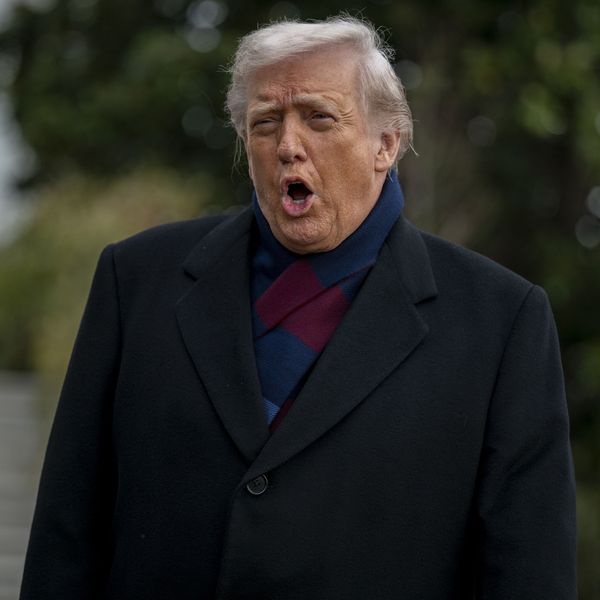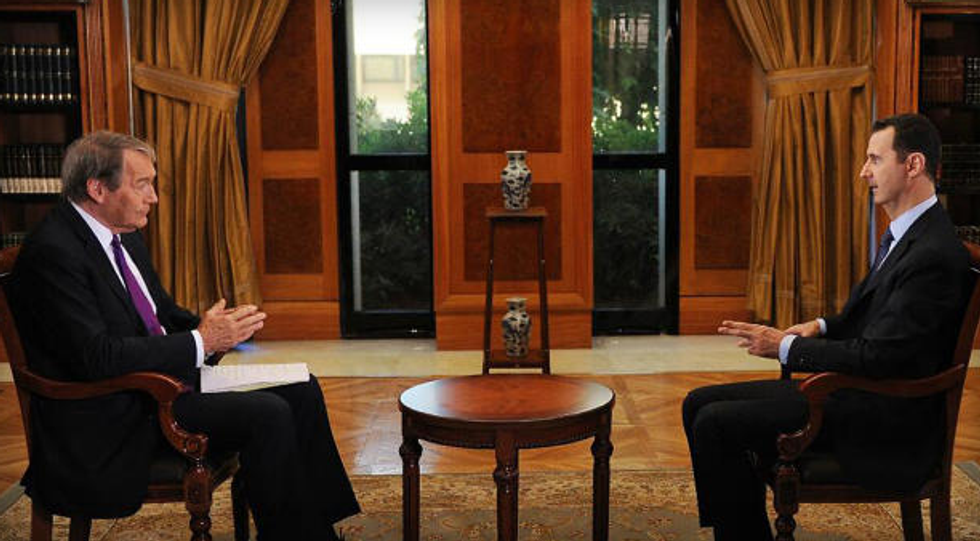UPDATE (12:30 PM ET):
U.S. Secretary of State John Kerry was for Syria giving up control of its chemical weapons before he was against it.
Jumping on comments made by Kerry earlier in the day (see below), Russia's Foreign Minister Sergei Lavrov backed the idea of having the Syrian government hand over control of its chemical weapons stock piles to a team of international monitors.
"We do not know whether Syria will agree to this, but if the establishment of international control over chemical weapons in that country will avoid strikes, we will immediately begin working with Damascus," Lavrov said. "We call on the Syrian leadership not only to agree on a statement of storage of chemical weapons under international supervision, but also to their subsequent destruction."
Following Russia's offer, however, the U.S. State Department immediately backtracked, with spokeswomen Jennifer Psaki saying that Kerry's earlier comments were only meant to make a "rhetorical" point about the unlikelihood of Assad ever bending to international pressure.
But, as Agence France-Presse and Reuters both tweeted shortly after Lavrov's proposal went public, the Syrians seem very keen to the idea of a negotiated settlement over their chemical weapons:
It remains to be seen how these latest developments will play out as official statements from all parties have yet to surface.
In the immediate term, however, what is striking so far is the speed with which the U.S. seems to have tried to close the door on the possibility of a coordinated resolution despite the fact a) it was their idea in the first b) it would ostensibly end the need for a war the American people clearly don't want and c) it would represent the kind of "political solution" that nearly everyone agrees is the only way to end the violence and bloodshed in Syria.
EARLIER
Syria's President Bashar al-Assad has one week to hand over his chemical weapons... or else.
That was the message from U.S. Secretary of State John Kerry on Monday at joint press conference with his British counterpart William Hague in London. Kerry acknowledged that he had no hope that Assad would do such a thing.
As the U.S. House of Representatives comes back into session after a long end-of-summer recess and President Obama readies a televised national address for Tuesday night, the White House is showing no signs of letting up on its push for war against Assad. In London, Kerry once again tried to paint the White House case for military intervention as iron clad despite still lingering questions about the quality of the intelligence or the wisdom of deepened U.S. armed involvement in the country's bloody civil war.
In a strange turn of phrase about the size and scope of a possible attack on Assad forces, Kerry used the London press conference to call U.S. military plans "unbelievably small" in scale.
"We will be able to hold Bashar al-Assad accountable without engaging in troops on the ground or any other prolonged kind of effort in a very limited, very targeted, short-term effort that degrades his capacity to deliver chemical weapons without assuming responsibility for Syria's civil war," he said. "That is exactly what we are talking about doing - unbelievably small, limited kind of effort."
Meanwhile, in his first interview with a U.S. media outlet since the events of August 21st, President Assad himself denied the U.S. government's version of events regarding chemical weapons and warned that an attack could have devastating consequences for the region. Speaking with PBS/CBS journalist Charlie Rose, Assad said: "There has been no evidence that I used chemical weapons against my own people."
Rose's interview with Assad will be aired Monday night on PBS, but CBS was showing select segments on its morning news show, CBS This Morning.
According to CBS, Assad warned that if his country was attacked by the U.S. and other countries, they should "expect every action" in retaliation.
"You should expect everything. Not necessarily from the government," Assad told Rose.
CBS termed those words a "clear reference to his allies in Iran and the Islamic militant group Hezbollah" and their reporting indicated that Assad was issuing a veiled warning to the U.S. by saying that his government is "not the only player in this region."
"You have different parties, you have different factions, you have different ideology. You have everything in this region now," said Assad.
According to the CBS:
Asked by Rose whether any retaliation for U.S. strikes could include the use of chemical weapons, Assad--whose government has never confirmed officially that it even has chemical weapons--said it would depend "if the rebels or the terrorists in this region or any other group have it. It could happen, I don't know. I am not fortune teller."
_______________________________________________



